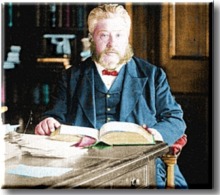From a sermon Spurgeon preached February 28, 1858 titled "Particular Redemption".

Now, beloved, when you hear any one laughing or jeering at a limited atonement, you may tell him this. General atonement is like a great wide bridge with only half an arch; it does not go across the stream: it only professes to go half way, it does not secure the salvation of anybody. Now, I had rather put my foot upon a bridge as narrow as Hungerford, which went all the way across, than on a bridge that was as wide as the world, if it did not go all the way across the stream. I am told it is my duty to say that all men have been redeemed, and I am told that there is a Scriptural warrant for it — “Who gave himself a ransom for all, to be testified in due time.” Now, that looks like a very, very great argument indeed on the other side of the question. For instance, look here. “The whole world is gone after him.” Did all the world go after Christ? “Then went all Judea and were baptized of him in Jordan.” Was all Judea, or all Jerusalem baptized in Jordan ? “Ye are of God, little children,” and “the whole world lieth in the wicked one.” Does “the whole world” there mean everybody? If so, how was it, then, that there were some who were “of God?” The words “world” and “all” are used in some seven or eight senses in Scripture; and it is very rarely that “all” means all persons, taken individually. The words are generally used to signify that Christ has redeemed some of all sorts — some Jews, some Gentiles, some rich, some poor, and has not restricted his redemption to either Jew or Gentile.

No comments:
Post a Comment